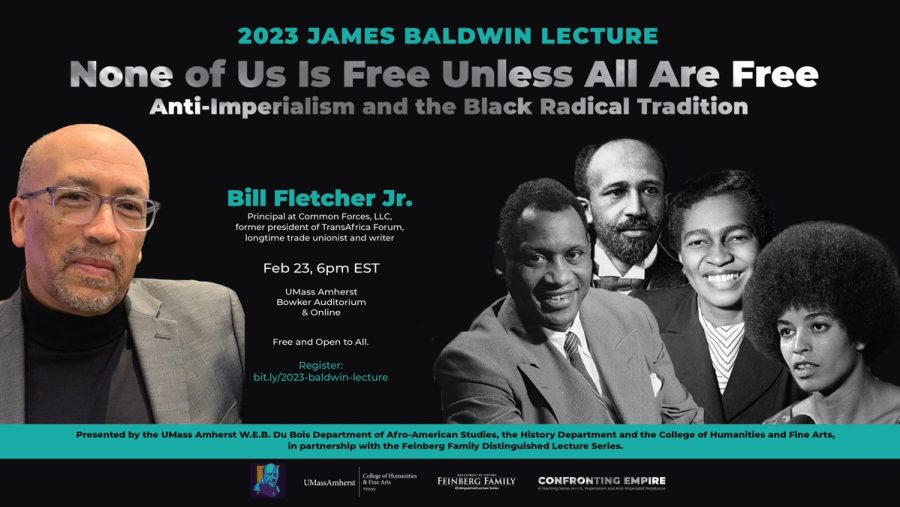On Feb. 23, the University of Massachusetts hosted the lecture, “None of Us Is Free Unless All Are Free: Anti-Imperialism and the Black Radical Tradition” in honor of Black History Month. The guest lecturer, Bill Fletcher Jr., is a racial justice activist, scholar and author.
The event began with opening remarks from Joye Bowman, professor of history and senior associate dean in the College of Humanities and Fine Arts. “This lecture honors the late James Baldwin, one of the most significant writers of the 20th century. Baldwin taught at UMass and in the Five Colleges for several years and continues to be an inspiration for many of us,” Bowman said.
Bowman then paid tribute to the late John Bracey, a professor of Afro-American studies at UMass who recently passed away.
“[Bracey’s] presence at UMass over the past 50 years helped to transform our campus and the lives of thousands of students, both in and out of the classroom,” Bowman said. “He will be sorely missed, but his legacy will live on through his students who continue the hard work of social justice and transformation that he so passionately fought for during his life.”
In Bowman’s introduction of Fletcher, she noted his involvement in activism since his teen years and his decision to become involved in the labor movement after college graduation. “Over the years he’s been engaged in workplace and community struggles, as well as on several electoral campaigns,” Bowman said.
Fletcher dedicated his remarks to the late Dr. Roderick Bush.
“Rod, as I knew him, was a committed social justice activist and scholar. It was with Rod that I had, years ago, some of my first discussions about this category called Black internationalism… He was taken from us far too early and is very much missed,” Fletcher said.
Fletcher, addressing Black anti-imperialism and internationalism said “I would argue that Black Internationalism is a [multifaceted] sea within Black America … which situates the U.S. African freedom struggle in an international context.”
“Therefore, Black anti-imperialism is a contradictory position, fundamentally rooted in a constantly evolving Black consciousness that holds a specific identification of the need for the masses of African Americans to embrace a practice that challenges imperialism,” he said.
Black internationalism gained prominence in 1783, through the work of Phyllis Wheatly and the impact of the Haitian Revolution according to Fletcher.
“Some of this proto-internationalism unfolded through missionary work and abolitionist work that was by Africans in the US,” Fletcher said, “With the latter, there was a special, and regularly ignored, role of African women in helping to internationalize the cause of abolition.”
Black internationalism, explained by Fletcher, is shaped around iconic figures, such as Malcom X and Dr. Martin Luther King Jr. “King spent his final year attempting to operationalize his internationalism. As frequently happens with Black people, when we stray outside of acceptable racial parameters, we’re accused of being everything but a child of God,” Fletcher said.
Fletcher concluded by emphasizing that Black internationalism is not a new phenomenon, but rather one that has been central to the Black American experience. “It’s a framework to understand white supremacist national oppression, as well as a lens through which to contemplate the necessary strategic and tactical alliances in order to gain freedom,” Fletcher said.
After the lecture, Dr. Toussaint Losier, an assistant professor of Afro-American studies at UMass, moderated a question-and-answer session.
The lecture was part of the 2022-2023 Feinberg Lecture Series, which according to their website, “is exploring histories of US imperialism and anti-imperialist resistance.”
Dr. Traci Parker, associate professor of Afro-American studies, explained the department’s decision to invite Bill Fletcher for a lecture. “We were all thinking about someone who was involved in labor, an activist, involved in organizing,” Parker said.
She noted how the James Baldwin Lecture event honored Bracey. “The work Bill Fletcher covered, in many ways, honored the type of work that John [Bracey] did … James Baldwin used to teach in our department. He spent several years working in Afro-American studies … I believe John Bracey was one of the people who helped bring Baldwin to Amherst to teach,” Parker said.
On March 28, the Afro-American studies department will host Dr. Gerald Horne for the workshop, “Political Economy Workshop: Black Reconstruction in America 1860-1880.”
Mia Vittimberga can be reached at [email protected] and followed on Twitter @MiaVittimberga.



















